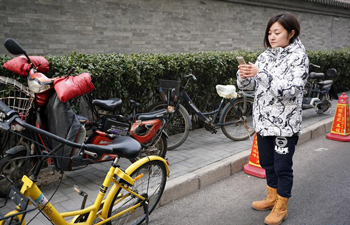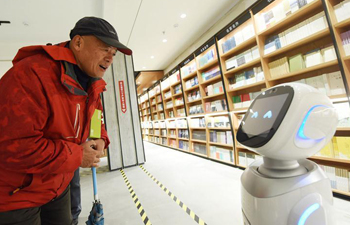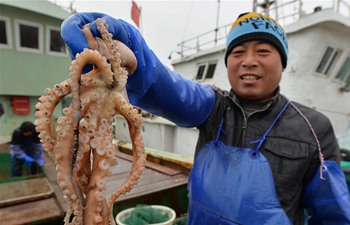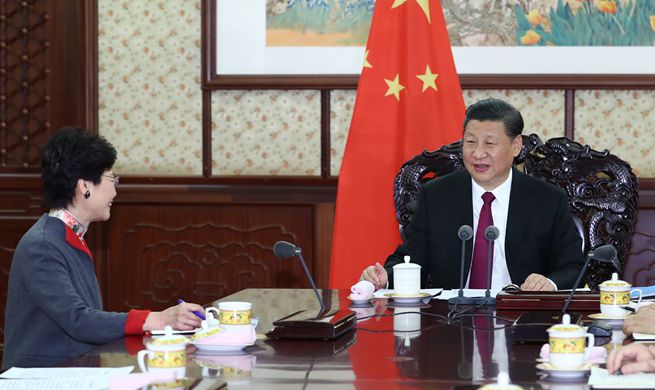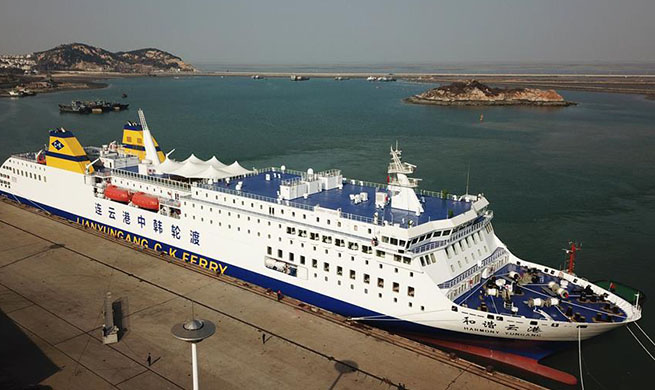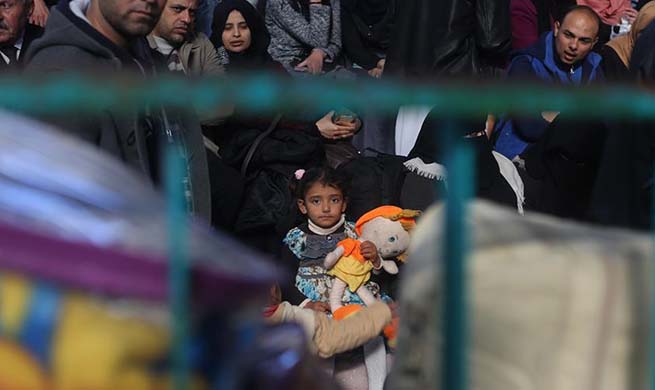CAIRO, Dec. 16 (Xinhua) -- For most Libyans, 2017 is another year of despair and frustration.
The Western-backed uprising in 2011 that toppled former leader Muammar Gaddafi's regime has failed to bring peace, stability and prosperity to the country as promised.
The once rich North African nation is still struggling today to cope with a series of challenges, including continuous political division, worsening humanitarian crisis, and increasing illegal immigration.
REPEATED FAILURES IN RECONCILIATION
Six years after the fall of strongman Gaddafi who had ruled the country for 42 years, Libya is politically fragmented today in a contest for power between two major regimes - one based in Tripoli and the other in the eastern city of Tobruk - both competing for international legitimacy.
The country has witnessed in recent years repeated failures in realizing a state of political unity and stability, despite the numerous rounds of efforts made by the international community, the United Nations in particular.
In December 2015, the two rival factions signed a UN-brokered peace deal in the Moroccan city of Skhirat, in which both parties agreed to establish one unity government in Tripoli to share power and make peace.
But the reconciliation process was stalled for the first time in January 2016, when the eastern-based parliament refused to recognize the UN-backed unity government, known as the Government of National Accord.
The Government of National Accord has since then been unable to make any effective decisions as it had lost its actual legitimacy in the absence of support from a major political actor.
In September, Ghassan Salame, head of the UN Support Mission in Libya, proposed a three-stage roadmap for Libya to put a permanent end to its political polarization.
The two parties negotiated over the amendment of the 2015 deal, included as the first step in the UN initiative, in Tunis in October.
Nevertheless, the UN plan was again aborted as the Tripoli-based Higher Council of State voted to reject the amendment in November and threatened to hold elections within six months to appoint a government of technocrats.
The Higher Council of State's rejection of the UN plan was perceived by many as another major setback for the already frustrating political transition in Libya.
Negotiations almost led the two warring parties to reach the end of the first stage, however, the rejection of the Higher Council of State rolled back the whole reconciliation process to its very beginning, said Libyan political analyst Majid Addawi.
The Libyan public attributes the failure to the participating political parties who fear the amendment would diminish their existing power and harm their interests.
Chances remain slim for the war-torn country to achieve internal reconciliation as long as the two powers refused to compromise and cooperate with each other to restore order in the nation, experts argued.
WORSENING HUMANITARIAN CRISIS
The UN-backed Libyan government forces announced at the end of 2016 the liberation of the western city of Sirte, the former stronghold of Islamic State (IS) in the country, issuing a seemingly inspiring message to the Libyans.
However, the announcement did not bring about sense of security to most civilians, as their safety is still severely threatened by escalating conflicts between armed groups, along with stubbornly high rate of crimes resulting from a vacuum of regulatory oversight.
Salame described the ongoing human rights crisis in the country as expanding on "an alarming scale."
At least 365 Libyans, including 79 children, had been killed or injured in indiscriminate fightings or airstrikes in residential areas this year, according to the UN envoy.
In the country's second largest city of Benghazi, violence erupts constantly as a civil war has torn the city apart.
Armed groups and gangs, some of which are in connection with the rival governments, took advantage of the absence of a functioning justice system to abduct civilians or foreigners for ransoms.
To make things worse, the remaining IS militants who were reportedly regrouping in the southern desert area, also put lives of civilians at risk as they committed inhumane killings, including the beheading of 11 people in February in the northwestern city of Sabratha.
The conflicts and terrorist activities have a devastating impact on civilians, cutting their access to food, clean water, power and medical care.
Libyan economy also collapsed with inflation hitting an incredibly high level and many Libyans can barely support their families.
An estimated 1.3 million people across the country are in urgent need of humanitarian assistance, according to a UN report in October.
"Joy has been absent from Libya for six years now, it is hard to celebrate the 2011 uprising at a time when terror attacks, bloodshed and displacement are plaguing this country," said Fatima Al-Magrahi, a social researcher from southern Libya.
UNSOLVED ISSUE OF ILLEGAL IMMIGRATION
In mid-November, the shocking report by the U.S. TV news network CNN that African migrants were sold as slaves in Libya drew widespread concern and criticism.
Despite the doubt over its authenticity, the report brought again public attention to the long-standing problem of illegal immigration that troubled both Libya and European countries.
Libya, due to its proximity to Europe and lack of border control, has been a favored transit hub for migrants who seek to reach Malta, Italy or other European countries through the Mediterranean.
Smugglers and human traffickers have transported thousands of illegal immigrants across the sea to the European shores, many of whom drown on the way.
Those who were rescued usually ended up in detention centers pending deportation, raising concerns about abuse of their human rights.
The illegal migration may also contribute to the expansion of terrorism as IS and other terror groups are reportedly recruiting new members from the homeless African migrants.
The Libyan government has vowed repeatedly to spare no efforts to cope with the issue. The European Union, which pledged to cooperate with Libya in discouraging the influx of refugees, has also made considerable investment in tightening the border control.
The measures have not been effective and will not, as long as the country remains chaotic and unstable due to the internal division.
Libya's UN-backed Prime Minister Fayez Serraj believed that the decisive and ultimate way to eliminate illegal migration in the country is to achieve stability, as it would provide the migrants with jobs and peaceful life that they have longed for in their countries of origin.






